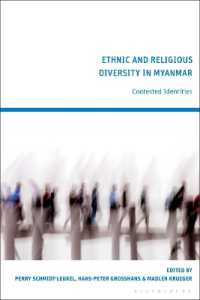- ホーム
- > 洋書
- > 英文書
- > Business / Economics
Full Description
Gender inequality is a global problem. The responsibility of the business sector, as one of the main agents of the global market, is to advocate for the economic empowerment of women by recognizing them as agents of growth and development in their various roles. This speaks directly to the advancement of Goal 5, Gender Equality, of the Sustainable Development Goals.
Economy, Gender and Academy: A Pending Conversation provides the quality information needed to analyze economic growth and the modernization of business management as well as design effective public policies that counteract the gender gap and allow for greater participation of women in society. Chapters explore a number of issues related to gender equality in Latin America and the Caribbean including the status of gender equity following the Covid-19 pandemic, gender equity within organizations, and gender policies and the teaching of gender equity.
A unique geographical assessment, Economy, Gender and Academy: A Pending Conversation offers to generate commitment around professional development to contribute to the construction of a more egalitarian society.
Contents
PART I. Gender equity, the impact of gender equality on the development of Latin American territories
Chapter 1. Educational materials in elementary education in México: A missed opportunity to promote gender equity; Jose Baltazar Garcia Horta and Maria Teresa Guerra Ramos
Chapter 2. Roles and Stereotypes of Latin American Women in The Drug Trafficking Economy; Jaime Andrés Wilches Tinjacá and
PART II. Gender policies and the teaching of gender equity in the context of the countries within the Latin American territories
Chapter 3. Favoring cultural integration from an education that exceeds sexism. south-south dialogue: Cuba, Argentina, Peru in the post-pandemic context; Marybexy Calcerrada Gutiérrez, Rafael Lorenzo Martín, Nolbis Espinosa Cruz, Magdaloys Peña Gutiérrez, and Olga Adriana Domínguez
Chapter 4. A spectre haunting academia: management and masculinities among chilean universities; Marcela Mandiola Cotroneo, Nicola Ríos González, and Aleosha Eridani
Chapter 5. Case of policies for gender equality in Latin America Andean Community of Nations - CAN (Colombia, Bolivia, Peru, Ecuador) ; Diana Mercedes Valdés Mosquera and July Alexandra Villalba Rodriguez
PART III. Gender equity within Latin American organizations in the context of the SDGs (internship - productivity)
Chapter 6. Alternatives for organizational change with a gender perspective; Alejandra Elizabeth Urbiola Solís
Chapter 7. Towards an essenctial museum the fight of two women for holocaust education; Laura Velez
PART IV. Final chapter: challenges, opportunities for academia, gender, SDG equity and organizations
Chapter 8. Asynchronous dialogues between academy, gender, and economy; Mario Enrique Vargas Sáenz and Marisol Salamanca Olmos
Chapter 9. Academy, Gender, SDG, Equity and Organizations; Gloria Nancy Rios and Laura Andrea Cristancho






